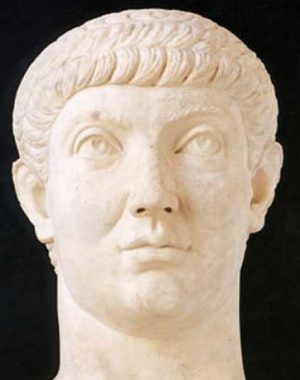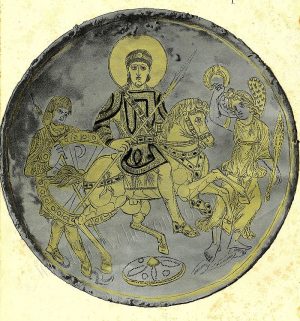| Constantius II | |
|---|---|
 |
|
| Roman Emperor | |
| In Power | Sep 9, 337 – Nov 3, 361 |
| Born | Aug 7, 317 Sirmium, Pannonia Inferior |
| Died | Nov 3, 361 (aged 44) Mopsuestia, Cilicia |
| Father | Constantine the Great |
| Mother | Fausta |
Flavius Julius Constantius, also known as Constantius II, was the second son of Constantine the Great by his second spouse, Fausta. He was born on August 7, 317, in Sirmium, present-day Serbia.
Conflict Agaisnt Shapur II
At seven years old, Constantius was declared Caesar by his father. Then, when he turned nineteen, his father gave him a severe test — to push back the invading Persians led by Shapur II. The Persians had taken over Mesopotamia and seized the city of Amida. Constantius braced for battle as he had to make the invaders pay for crashing deep into Roman territory.
Constantius found himself facing off against Shapur II’s general, Narses, in what came to be known as the Battle of Narses. Narses’ troops did not waste time and charged rapidly toward Constantius’ men. The young Caesar’s troops suffered some deaths but managed to retaliate against the enemy. The two forces went back and forth against each other until the struggle brought them to Narasara. Constantius eventually crushed the enemy troops, and Narses lay dead on the battleground. Following this, Constantius ordered Amida’s walls to be built thicker and higher to better defend against invaders.
Rise to Power
When Constantine the Great died in 337, Constantius ascended to the throne, along with his brothers, Constantine II and Constans. The three emperors were expected to share the empire’s territories with their cousins and junior emperors, Dalmatius and Hannibalianus. However, the brothers wanted to keep the empire to themselves. Soon, Dalmatius was mysteriously killed by his soldiers, and Hannibalianus died too, under obscure circumstances. The killings went on to include all of the brothers’ male cousins, except for two, who were infants. Some historians say that it was Constantine II who orchestrated the purge, but some say it was Constantius.
Reign
The three brothers went on and divided the empire among themselves. Constantius took Egypt, Syria, Asia Minor, and Constantinople; Constantine II received Gaul, Hispania, and Britannia; and Constans claimed Thrace, Macedonia, and North Africa. Not long after, Constantine II, who was the eldest of the three, felt cheated by the division of territories. As the eldest, he asserted that he should have received more territories. Shortly after, he ordered Constans to hand over large portions of his domain. Their territorial bickering ultimately led to a battle that resulted in Constantine II’s death.
Constans then took over his dead brother’s domains and ruled his vast territories until rumors of homosexuality and laziness hurt his popularity. His unpopularity encouraged a general in the Rhine named Magnentius to declare himself emperor of the west. Knowing he had no chance to defeat the rebel, Constans fled towards Hispania. Unfortunately for him, he was soon cornered by Magnentius’ men inside a temple, where he was killed.
Apart from Magnentius, an old general in Illyricum named Vetranius was declared emperor by his troops. Constantius knew he had to defuse the situation to deal with the much more dangerous Magnentius. Constantius sent his sister, Constantina, to Vetranius to tell him he was recognized as emperor and ally against Magnentius. Constantius then marched his troops to meet Vetranius, but upon their meeting, the old general put on a show of surrendering to Constantius and affirming his loyalty. After this, he accepted Constantius’ offer of riches and a comfortable life in Bithynia, away from the public eye.
With Vetranius out of the way, Constantius set his sights on Magnentius. In 351, he marched his troops to Mursa Major, where they suffered immense casualties before defeating Magnentius’ troops. Magnentius escaped to Aquileia, but he again faced Constantius in the Battle of Mons Seleucus two years later. Constantius crushed Magnentius’ forces, and, following this second defeat, Magnentius decided to kill himself by falling on his sword.
After putting away Magnentius, Constantius confronted the Alamanni, who were constantly plundering the empire’s Danubian regions. Constantius had been battling against them for two years when he heard that his cousin and junior emperor, Gallus, was planning to usurp the throne. Constantius quickly drew up a peace treaty that ended the conflict with the Alamanni, then called for Gallus to appear before him. To better judge the rumors, he also ordered his sister Constantina, Gallus’ wife, to come along. Constantina went on her way to Constantius but died in Bithynia due to a sudden fever. Gallus turned suspicious and decided not to appear before Constantius. Constantius then set a trap for his cousin — he sent his chief of bodyguards to Gallus to tell him that he would be declared co-emperor. Gallus fell for the ruse, left Antioch, and went on his way. He was arrested by Constantius’ men in Noricum and questioned by court officials. Gallus insisted on his innocence and blamed Constantina. This only enraged Constantius, and he ordered Gallus to be executed. Constantius changed his mind later, but unfortunately for Gallus, the order to stop the execution came too late.
Constantius had a well-known argument with his younger brother Constans about Christianity, the faith that their father had upheld and fostered. Constans had been promoting Christianity, but Constantius was promoting its Arian version. Arianism had already been ruled as heresy in the Nicene Creed of 325, and so the two brothers, along with 170 bishops, tried to settle the matter at the Council of Serdica. The council failed its purpose, and the two emperors seemed to be preparing for war. However, the brothers soon agreed to foster their chosen faith in their respective territories. Constantius enacted the law that spared priests from tax obligations and the law that banned Jews from marrying Christians.
Constantius would be troubled by more rebellions in the latter years of his reign. To ensure the survival of the Constantinian dynasty, he granted the status of Caesar to his remaining male relative, Julian. Constantius then sent Julian off to Gaul to suppress another revolt while he headed to the eastern front for one more confrontation with Shapur II and the Persians. Soon, Constantius had to ask Julian to send troops to help him fight the invaders. Julian’s troops, however, refused to face the Persians and instead declared their leader as their emperor. Constantius sent messengers to Julian, pleading that he remain as Caesar, but he failed. In frustration, Constantius decided to leave the eastern border to talk to his cousin himself.
Death
While on his way to face his rebelling cousin, Constantius was overtaken by a fever. He was forced to stop at Cilicia, where he weakened further. He then requested the bishop of Antioch to baptize him before he died. After this, he proclaimed Julian as his successor. Constantius succumbed to the fever on November 3, 361. He ruled the empire for 24 years and was Constantine the Great’s longest-ruling son.
